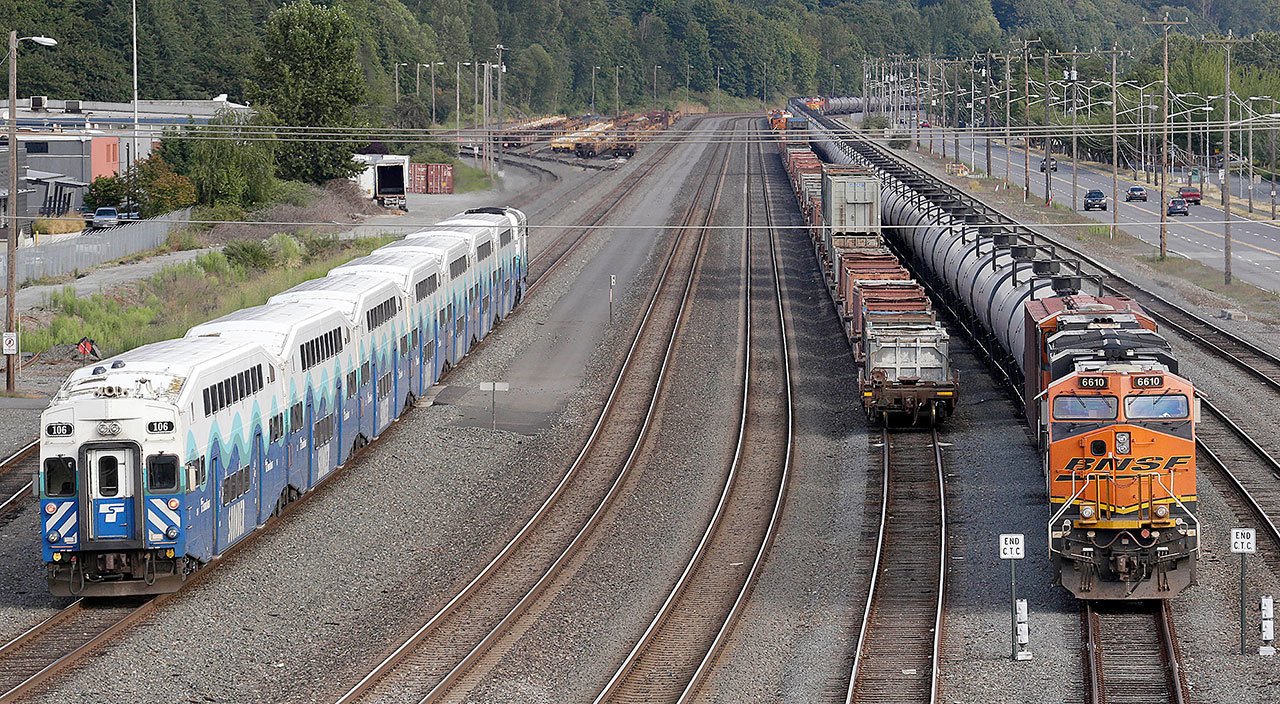By Phuong Le
Associated Press
SEATTLE — As crude oil trains began rolling through its downtown a few years ago, Spokane was among the first cities to pass a resolution calling for stronger federal safety regulations.
But when a mile-long train derailed in the scenic Columbia River Gorge along the Oregon-Washington border last month — after earlier passing through this major railroad hub in eastern Washington — some city leaders said they couldn’t wait for tougher federal protections.
This week the Spokane City Council decided 6-0 to ask voters in November whether the city should prohibit the shipment of crude oil or coal by rail. The ballot measure, if approved, would make rail shipments of crude oil or coal a civil infraction, punishable by a fine of up to $261 per tank car.
Spokane is certain to face a steep uphill legal fight, since the federal government regulates railroad operations and safety. Even councilmembers expect the matter to end up in court, though some say it’s worth putting to voters.
Main rail lines converge in Spokane and there’s no realistic alternative route, BNSF Railway spokesman Gus Melonas said.
“There have been a distressing number of incidents in the U.S. and Canada with oil trains derailing or exploding, sometimes with catastrophic consequences, so cities certainly have a strong reason to regulate this kind of traffic,” said Michael Gerrard, a professor and director of the Sabin Center for Climate Change Law at Columbia University. “Unfortunately, the jurisdiction over it is firmly centered on the federal government.”
Spokane, which sees up to 19 oil trains a week, is the latest community attempting to assert its local authority in the fight over fossil fuels. Cities from Oakland, California, to South Portland, Maine, have also passed local ordinances to block crude oil or coal terminal projects.
Last month, Oakland unanimously voted to ban the handling and storage of coal and petroleum coke at bulk material facilities or terminals in Oakland over concerns about public health and safety hazards.
Meanwhile, South Portland is defending its city ban on the loading of crude oil into tankers in Portland Harbor in federal court. Its ordinance also prevented the Portland Pipe Line Corp., which sued the city, from reversing the flow of its pipeline to bring Canadian tar sands oil into Maine. The company says the ordinance is unconstitutional; the city argues it is exercising traditional police power and land use authority.
And last week, Vancouver in southwest Washington voted to ban new or expanded crude oil storage facilities. The decision, however, won’t affect a massive crude-by-rail facility currently proposed at the city’s port and which the city has opposed.
Spokane’s measure is unusual in that the city of 210,000 people is trying to regulate which goods are shipped in trains, rather than other local attempts to regulate the construction of facilities that receive oil or coal.
“I believe personally that there’s something we have to do, and that means try every single argument that we possibly can in order to make a difference and make Spokane safer,” Council President Ben Stuckart before Monday night’s vote.
Some at the meeting criticized the tactic and worried about potential costs to taxpayers if the city has to defend it.
In a memo, the council’s legal adviser wrote there is likely a small chance the proposed ordinance would survive a legal challenge. But Councilman Breean Beggs, an attorney, believes a provision of the Federal Railroad Safety Act allows states to adopt certain laws to protect a local safety hazard — in this case Spokane’s sole source drinking water aquifer — if the federal government hasn’t yet addressed the issue.
Other municipalities have fought in different ways, including two Illinois communities that last year challenged new train safety rules they say would allow the continued use of oil tank cars known to fail during accidents.
Andrew Johnsen, BNSF Railway’s assistant vice-president of community affairs, wrote to the Spokane council Tuesday, saying its proposed ordinance, if enacted, would be pre-empted by federal laws. He said moving hazardous materials by rail is safe, and added that it appeared the “proposed ban is less about safety and more about a political agenda against fossil fuels.”
Justin Jacobs, a Union Pacific Railroad spokesman, wrote in an email that if a customer delivers an oil or coal rail car within federal regulations, the railroad is required to transport it to its destination.
But Eddie Scher, a spokesman with advocacy group Stand, said Spokane can and should make the case for authority over oil trains.
“Public safety has to come first,” he said. “Deadly oil trains were not on the table when pre-emption was dreamed up.”
Talk to us
> Give us your news tips.
> Send us a letter to the editor.
> More Herald contact information.

























